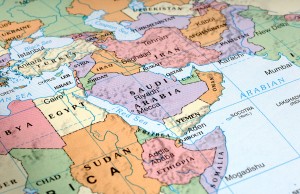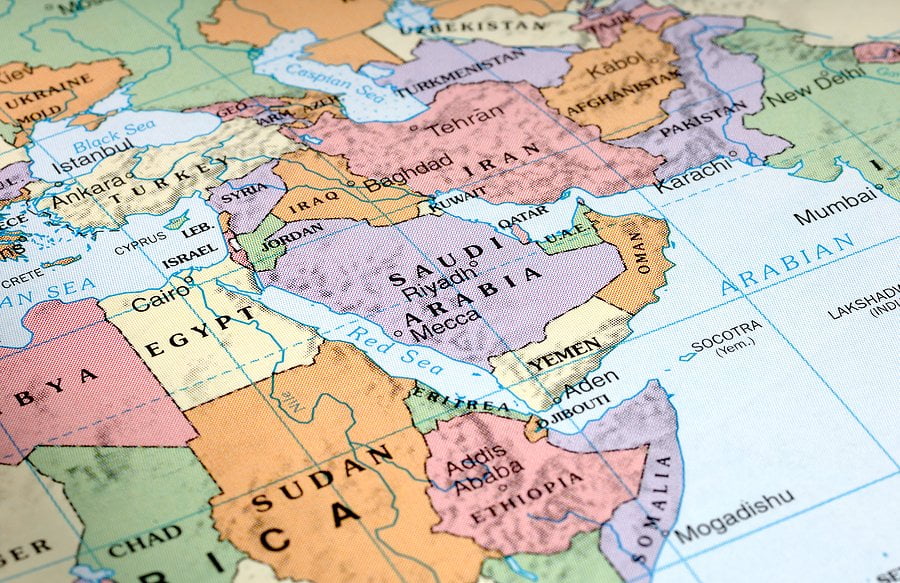2012-08-21 By Richard Weitz
I have dealt with the bilateral relationship between Iraq and Saudi Arabia. In this piece, I am going to deal with Iraq’s bilateral relationships with the other GCC states.
Kuwait
Historical factors make Iraq’s relations with GCC member Kuwait especially important.
Kuwait’s territorial integrity and sovereignty were both violated by Iraq in 1990, when Saddam Hussein tried to expropriate Kuwait’s oil resources and avoid repaying Kuwait the debt it had incurred during its costly war with Iran in the 1980s. Iraqi officials called Kuwait a recovered Iraqi province that the British had dismembered nearly 150 years ago to prevent Iraq from attaining easy access to Persian Gulf waters.
After Operation Desert Storm restored Kuwait’s freedom, the Kuwaiti royal family demanded reparations for war damages, including lost revenues from the oil wells that retreating Iraqi forces had set ablaze. Iraq has paid more than $20 billion in reparations to Kuwait, but still owes about $15 billion.
These substantial reparations, amounting to five percent of Iraq’s oil revenues, are a point of frustration for the leaders of new Iraqi state. From Iraq’s’ perspective, they desperately need funds for development but their country is held accountable for the actions of deposed dictator Saddam Hussein, who they tried and executed.
Furthermore, the Kuwaiti government has demanded that Iraq pay $1.2 billion in compensation for Saddam’s seizing Kuwaiti Airways’ passanger planes during the 1990-91 occupation.

And the shaping of a new Iraqi state intersections with ethnic dynamics in the region. Credit Image: Bigstock
Additional sources of bilateral tension are the fate of hundreds of Kuwaiti prisoners and other Kuwaitis who disappeared during the occupation as well as Kuwaiti missing property from that time, which includes the state archives.
These strains have impeded Iraqi efforts to break out of the UN Chapter 7 penalties that were imposed on Iraq following its August 1990 invasion of Iraq.
Nonetheless, relations between Iraq and Kuwait have been on the upswing in recent years.
In May 2010, Iraq sent its first ambassador to Kuwait since the Iraq invasion. Kuwait has had an ambassador in Iraq since 2008.
Furthermore, the Iraqi Human Rights Ministry published the names and pictures of missing persons on its website to advance the search for Kuwaiti nationals who disappeared in the 1990-91.
In March 2012 Kuwait’s Emir Sheikh Sabah al-Ahmad Al-Sabah attended the Arab League summit in Baghdad, the first time a Kuwaiti leader had visited the Iraqi capital in 22 years.
Iraq and Kuwait have also recently agreed to a $500 million settlement to their airplane dispute. Iraq will pay Kuwaiti Airlines $300 million in cash, while contributing an additional $200 million to establish a joint air lines with Kuwait, whose government will contribute a similar $200 to start the new joint company.
UN Security Council Resolution 833 (1993) established an international commission to demarcate the Iraq-Kuwait border. Iraqi officials then objected to the commission’s decision to award Kuwait territory in the Safwan and Umm Qasr areas claimed by Baghdad, as well as some maritime areas that Iraq claims as its national waters.
But in May 2012 the two countries’ permanent UN representatives jointly asked the United Nations to begin repairing the border markers along the lines specified by the commission.
In July 2012, Kuwait requested that the UN Security Council appoint a high-level coordinator or a special representative of the UN Secretary General to address all of Iraq’s obligations toward Kuwait. The new person would enlarge the mandate of the UN high-level coordinator for missing Kuwaitis and property, who will retire at the end of 2012.
A compromise might even be in the works on a newly divisive issue: Kuwait’s unexpected announcement that it would construct a billion-dollar Mubarak Al-Kabeer port on Kuwait’s Bubiyan Island.
The new facility could interfere with Iraq’s use of the Shatt al-Arab, Iraq’s only maritime access to the Persian Gulf. Iraqis also fear the new port will deprive their Gulf ports of Basra, Khor al-Amyah, Um Qasr, and Khor A-Zubair of much business after its scheduled completion in 2016.
Iraqis were especially irritated that Kuwait has decided to build the Mubarak complex so close to the new port Iraqis were already constructing close to Umm Qasr, at a cost of some $1.6 billion, in an effort to expand their oil sales and other commerce.
Despite their historical tensions, Kuwaitis have emerged as the leading proponent for Iraq’s eventual membership in the GCC. In late April 2012, a group of Kuwaiti cabinet members and members of parliament said that Iraq’s entry into the GCC would “better serve mutual interests and economic development in the region.”
Those mutual interests include Kuwaiti investment in Iraq to assist in reconstruction efforts, which could promote regional prosperity and stability as well as positive relations between Iraq and its Arab neighbors.
UAE
Iraq’s relations with the UAE have also improved.
In January 2012, the UAE announced it would waive Iraq’s $5.8 billion debt—the result of Iraq borrowing money from Gulf states to fund its war with Iran in the 1980s—as well as support holding an Arab summit in Baghdad. These conciliatory efforts were part of a larger initiative on the part of the UAE to foster stronger relations between Iraq and the GCC.
The UAE’s recent debt waiver was not the first time the UAE assisted Iraq financially. As early as 2008, the UAE cancelled nearly $7 billion of Iraqi debt dating from Saddam Hussein.
The UAE has also been more open to trading with Iraq and investing in that country. Iraq’s trade with the UAE in 2011 amounted to more than $4.5 billion. In April 2012, Iraq looked to the UAE to improve its infrastructure, signing a contract with the UAE’s Oilfield Services to help meet Iraq’s unmet demand for electricity.
These reciprocal economic ties give both countries strong mutual interests in maintain good relations in coming years.
Qatar
Iraq’s relations with Qatar have been especially bad.
Qatari officials have complained the most strongly of the GCC governments to the “marginalization” of Iraq’s Sunni Arab minority since Saddam’s removal.
One early Iraqi complaint was that the Qatar-based Al Jazeera TV network portrayed the Sunni insurgents in Iraq in a sympathetic light.
Qatar signaled its continuing rejection of Iraqi policies by sending only low-level representation to the Arab League summit that occurred in Baghdad in March 2012. Prime Minister Sheikh Hamad bin Jassem bin Jabr al-Thani explained that, “‘Qatar wants the Iraqi government to resolve disputes in a way that unites Iraqi people and gives everyone their rights through a dialogue involving all parties.’”
The summit apparently did not allay these worries. A few days later, Tariq al-Hashemi, Iraq’s fugitive vice president, made an official visit to Doha at the invitation of the Qatari government, which also flew him from Iraqi Kurdistan.
Hussein al-Shahristani, Iraq’s deputy prime minister, told a Baghdad news conference that Qatar’s decision to host al-Hashemi was “unacceptable.” Prime Minister al-Maliki added that Hashemi “is wanted in a member country of the Arab League, and he should not be received, especially under the title of vice president.”
Khaled al-Attiyah, Qatar’s state minister for foreign affairs, rejected Baghdad’s extradition request, asserting that, “Mr Hashemi came in his capacity as a vice president and he continues to occupy this post, and has not been sentenced or stripped of his title.”
Iraqi and Qatar have also attacked one another’s policies toward Syria. Iraq wants to continue diplomatic efforts to resolve the Syrian crisis, while Qatar has been leading the charge to arm the Sunni-led Syrian opposition.
Commercial relations have been improving, albeit slowly. For example, Qatar Airways announced that it would operate direct flights from Doha to Baghdad and Irbil beginning in May 2012.
The March 2011 deployment of 1,200 Saudi troops and 800 police personnel from the UAE to stabilize the Sunni-governed island of Bahrain amid ongoing Shiite protests further exacerbated sectarian tensions between the GCC and Iraq.
Officially deployed as part of the GCC’s Peninsula Shield Force, many Shiites saw the troops, as a collective Sunni mechanism to suppress Shiite demands for greater rights and justice in Arab countries.
The event sparked widespread Shiite protests throughout Iraq and denunciation of the GCC deployment by several Iraqi government officials, including Maliki, who warned that the intervention in Bahrain’s affairs could “turn into a sectarian issue.”
The Bahrain Independent Commission of Inquiry, appointed by King Hamad bin Isa al-Khalifa, concluded that the spring 2011 protests were due primarily to indigenous factors and that there was not ‘‘a discernible link’’ between the unrest and Iran.
Even so, Bahraini authorities have retaliated for Iraqi Shiite leaders support for the unrest by sending only the Bahraini foreign minister to the March 2012 Arab League summit in Baghdad and canceling flights to Iraq by the Bahraini national airline, Gulf Air.


